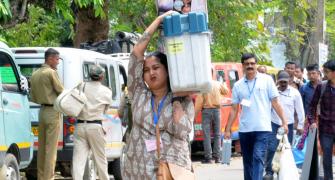Former Atomic Energy Regulatory Board chairman Dr A Gopalakrishnan makes a case against the nuclear liability bill.
The Statement of Objects and Reasons accompanying the draft Nuclear Damage Liability Bill 2010 brings out two major reasons for introducing this bill at this time. Firstly, it is said that "as a result of the steps taken particularly in the recent period" the nuclear industry in India is expected to form an important part of the energy mix of the country.
These recent steps mentioned here appear to be a reference to the Indo-US nuclear deal which Prime Minister Manmohan Singh had put in place during the United Progressive Alliance-1 government, in spite of wide-spread opposition. Secondly, the government argues that the geographic scope of damage caused by a nuclear accident may have trans-boundary effects in neighbouring countries, and it is desirable that protection is accorded to victims by a third party liability regime. On this basis, a case is made that such an appropriate international liability regime is the Convention on Supplementary Compensation, to join which it is essential that our national liability legislation must be framed in line with the CSC.
The government has never established the case that import of about 40,000 MWe worth Light Water Reactors is essential to ensure the long-term energy security of India. At what enormous capital cost we plan to acquire these power sources, what will be the ultimate cost of electricity per unit when all elements of cost are factored in, at what substantially enhanced risks to the public's life, health and the environment will these reactors be set up, etc are just few of the questions for which no answers have been given by the government in the last five years since the nuclear policy reversals were initiated.
In short, the assertion of the government that importing 40,000 MWe of LWRs, in the 2015-2035 period, will be the only solution to ensure our long-term energy security is a theory which appears to have been advanced only to facilitate the government's intent to provide a substantial market in India for the US nuclear industry, perhaps as a partial price for cementing the Indo-US strategic alliance, which appears to be the prime minister's life's ambition during his official tenure.
In pushing for India to accede to the CSC, the government's overt implication is that a good portion of the liability for trans-boundary effects in neighbouring countries, arising from an Indian nuclear accident, will be met from part of the collective contributions from the CSC members. What the government is hiding from Parliament and the public is the fact that our joining the CSC will not bring in any additional international financial assistance in such an instance as long as our neighbours, namely, Pakistan, Bhutan, Bangaladesh, and Sri Lanka do not also become members of the CSC.
These countries are the ones who are most likely to suffer from trans-boundary impacts due to an Indian nuclear accident. But they are not members of the CSC today, and have indicated no interest at all in acceding to the CSC in future.
Furthermore, the government has conveniently hidden from Parliament and the public that only non-military, International Atomic Energy Agency-safeguarded nuclear facilities will be eligible for listing under the CSC and for deriving any benefits from it. By 2014, India will have 21 operating nuclear power reactors, of which only 14 are planned to be put under IAEA safeguards.
Thus, the entire set of remaining nuclear power and military reactors, including the CIRUS and Dhruva reactors in the Bhabha Atomic Research Centre, and the potentially much more hazardous weapons facilities and laboratories, the plutonium reprocessing plants, radioactive waste storage and processing facilities, the high-risk submarine test reactor, and the even higher risk reactor operated in our nuclear submarine etc will not be eligible for any share of the CSC collective compensation, in case of an accident, since they do not qualify as safeguarded 'peaceful' nuclear installations.
The compulsion that the Nuclear Liability Bill should be consistent with the CSC has also distorted what normally one would expect to be covered in a national nuclear liability legislation. A case in point is the omission of hazardous incidents which could arise from the misuse of radioactive sources, like the incident which happened in the recent past in Delhi.
Since the CSC disallows any 'nuclear damage' arising from mishandling of fabricated radioactive sources or devices used in industry, medicine, agriculture, commerce or scientific research from being eligible for compensation, the government has also decided to discard the legal compensation rights of Indian victims who might suffer damages from radioactive sources from the purview of the national nuclear liability bill.
So, why is the UPA government putting forth this false pretext and urgency to introduce the liability bill, ostensibly to take care of trans-boundary effects and the envisaged acceleration of the nuclear power program? The true reason for the urgency for getting the bill passed is to meet the written commitment given by the prime minister and the UPA-1 government, way back in September 2008, that India shall purchase a minimum of 10,000 MWe of US reactors, and that we shall take all steps necessary to adhere to the CSC.
These two promises from the government of India are explicitly stated in the letter dated September 10, 2008 from our foreign secretary to the US Undersecretary of State, sent out under the instructions of the prime minister. He made this commitment on his own, without even informing Parliament or the public at any time. This sell-out to the Americans has also been kept hidden from Parliament in all the deliberations on the liability bill, while the desirability of joining the CSC is being argued on the basis of other false and baseless pretexts.
To understand the US tactics to put pressure on our prime minister, to which he succumbed rather readily, see the dateline of four crucial events given below:
The third and final draft of the Nuclear Suppliers Group document giving non-proliferation clearance to the Indian civilian nuclear program was discussed at the NSG forum and concurred with on September 4-5, 2008. The US government took the lead in piloting the draft through the NSG.
Foreign Secretary Shiv Shankar Menon is directed by the PM to write an official letter to the US Undersecretary of State, promising India's willingness to place orders on US nuclear companies for a minimum of 10,000 MWe of LWRs; and that India shall take all steps necessary to adhere to the CSC. He wrote this letter on September 10, 2008.
The US State Department introduced the 123 Agreement Bill in the US Congress on September 23-24, 2008.
The US President signed the India-US 123 Agreement into law on October 8, 2008.
It is obvious what was happening here. At the instance of the US and Indian business lobbies, the US State Department held up the forward movement of the 123 Agreement onto the US Congress until the written promise of India was conveyed from Delhi on India's agreement to join the CSC and our willingness to purchase at least 10,000 MWe of US reactors.
The US, in turn, delivered their part of the bargain of obtaining the NSG clearance, before such a letter of promise from India was to be delivered, but waited for India's letter to arrive before they took the next step. It is obvious that the sequence of events which unfolded was agreed before-hand between the UPA government and the US administration. By sending out that letter, the PM had written off much of the crucial legal cover for potential nuclear accident victims in the future.
The prime minister's unilateral promise to the US government on the CSC was given in his anxiety to further the Indo-US strategic alliance, for which the Americans demanded this as part of the price. This unwarranted written assurance given by the PM in 2008, to help obtain the NSG clearance and the passage of the 123 Agreement through the US Congress, has now come to haunt the government in the context of the liability bill.
Why are the Americans insisting that India must join the CSC? Because, they do not want any US nuclear supplier to face the kind of trauma and legal problems experienced by Warren Anderson and the Union Carbide Company in the past, following the Bhopal incident. The US government and the business entities in both countries know that to be accepted as a member country of the CSC, India's own nuclear liability law has to be first enacted, and it is mandatory that this law is fully consistent with all the stipulations of the annexure of the CSC.
This condition will be imposed because India is not a member of the Vienna Convention on Nuclear Liability. Among other things, what the CSC annex insists on is that the national law should legally channel the liability for all nuclear accidents in India solely and absolutely to the 'operator' of the facility, absolving all others including the suppliers of the equipment and systems from any criminal or civil liability. Further, the CSC annex wants the quantum and period for such compensation to be limited, the jurisdiction of all cases arising from claims to be settled only with Indian courts, etc.
This would mean the national law cannot have unlimited cap for compensation, and victims of accidents can neither sue the foreign reactor suppliers nor can they approach the US courts in appeal. Thus, the Americans thought of this strategy in 2008 and ensured that India commits then itself to joining the CSC in due course, before they went ahead with the nuclear deal. Other than this well-targeted and consistent American pressure, there is no logical reason why India needs to join any international nuclear liability regime -- neither the Vienna Convention nor the CSC. Suppressing this real background, the government has now presented the liability bill to Parliament, citing some baseless and false premises of an entirely different nature.
As per the current Atomic Energy Act, nuclear reactors can be set up either directly by government, or a public sector undertaking like the Nuclear Power Corporation of India Limited, or by a government company, in which upto 49 percent of the share capital can be held by a private company. If all expenses for setting up and operating nuclear plants come from the tax-payer eventually, as is the case if the operator is the government or a public sector company, then there is no need for an artificial split of the total compensation into two parts, a smaller part to be borne by the operator and the larger share by the government, since both these amounts will be coming from public funds.
But, when a government company is the operator, upto 49 percent of the share capital could be from a private sector energy company and the private company will also take upto 49 percent of the profit. But, the private party will have to also bear upto 49 percent of the compensation payment. To help out these business entities, under pressure from their federations, the government has split the compensation into two parts in the bill, and now the private party has to pay only upto 49 percent of the smaller part of the compensation ear-marked for the 'operator'.
Furthermore, the government's intention is to first get the liability bill passed, and then to amend the Atomic Energy Act to allow 100 percent private ownership and profit-taking by private energy companies. Then, the current wording of the bill will allow these private entities to get away by paying a small share of the total compensation burden, leaving the government (tax-payer) to shoulder the bulk of the liability.
This is the Manmohan Singh doctrine of encouraging the private sector at the expense of the law-abiding tax-payers! When it is the reaping of profits from the nuclear sector, it will go to the private companies, and when it comes to the large liabilities arising out of their negligence, bulk of it will be borne by the ordinary citizens of this country
Accordingly, the Civil Liability for Nuclear Damage Bill 2010 currently before the Parliament is a US-centric bill, drafted primarily to satisfy the US demands and business interests, ditching the rights of Indian victims wherever this was necessary to make the bill conform to the CSC. Parliament must, therefore, reject the bill as it now stands and ask the government to redraft it as an India-centric legislation and resubmit it for consideration.
Dr A Gopalakrishnan was the chairman of the Atomic Energy Regulatory Board from 1993-1996.





